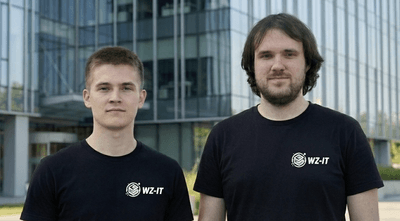Slack vs Rocket.Chat: An Open-Source Alternative for Enterprises (GDPR-Compliant)

Choosing a platform for team communication today is more than a question of features and convenience - it concerns data protection, data sovereignty, integration capability and long-term operating costs. Especially for companies in regulated industries (e.g. healthcare, finance, public administration), control over the infrastructure and compliance is a decisive criterion.
Slack is widely established as a cloud-based collaboration platform with an extensive integration ecosystem. Rocket.Chat is an open source alternative that allows both self-hosting and managed hosting and prioritizes data control.
Note: In addition to Rocket.Chat, Mattermost is also a strong open source alternative to Slack - both offer self-hosting, GDPR compliance and full data control. Which solution is right for your company depends on your specific requirements.
In this article, we take a careful look at how Slack and Rocket.Chat differ from the perspective of IT decision-makers, system administrators, developers and data protection/compliance officers, particularly with regard to:
- Integration into existing infrastructures
- Architecture, operation and technical feasibility
- Everyday user experience
- Data protection, GDPR and compliance
- Costs, scalability and strategic use
The aim is to provide a sound basis for decision-making - without marketing platitudes.
Table of Contents
- Brief presentation of the solutions
- Functional and technical comparison
- User experience and practice in day-to-day business
- Data protection and GDPR
- Operation and costs
- Conclusion and recommendation
- Our services for your communication infrastructure
- Contact us
- Sources and further links
Brief presentation of the solutions
Slack
- Manufacturer & license model Slack Technologies (now part of Salesforce) offers Slack as a proprietary SaaS solution. It is mainly used via subscriptions (Freemium, Standard, Plus, Enterprise). (Wikipedia: Slack)
- Architecture (Cloud / Self-Hosted / Hybrid) Slack exists exclusively as a hosted service - a user cannot host Slack themselves or control the infrastructure.
- Target groups & application scenarios Teams, start-ups, medium-sized and larger companies that want a quick start, a wide range of integrations and minimal in-house operation.
- Technological basis & community Slack relies on web, desktop and mobile clients; developers use the Slack Web API, Events API, SDKs (e.g. Bolt). The community mainly participates through app development in the app directory.
- Main advantages & restrictions ✅ Very good user-friendliness, high reliability and numerous integrations ✅ Little operational effort for the company ❌ No influence on infrastructure, no control over data storage ❌ License costs can increase significantly with growing user numbers ❌ Data protection risks for data outside the EU
Rocket.Chat
- Manufacturer & license model Rocket.Chat Technologies operates the project with an open source core (MIT license) and offers additional enterprise functions and support options for a fee. (Wikipedia: Rocket.Chat)
- Architecture (Cloud / Self-Hosted / Hybrid) Rocket.Chat can be self-hosted (e.g. Docker, Kubernetes or bare metal), alternatively operated as a managed instance or in a hybrid setup. (Rocket.Chat Documentation)
- Target groups & application scenarios Organizations with high data protection and compliance requirements, public institutions, companies with a desire for data sovereignty.
- Technological basis & community Rocket.Chat is implemented in TypeScript / Node.js, typically with MongoDB as the database. Custom extensions can be developed in TypeScript via the apps engine. (Developer Documentation) The community is active - there are numerous plugins, integrations and contributions.
- Main advantages & restrictions ✅ Full control over infrastructure and data ✅ Open source, white labeling, customizability ✅ Flexible deployment options ❌ Own responsibility for operation, updates, scaling ❌ Initial investment in infrastructure and expertise required ❌ Some features may have to be supplemented by in-house development
Functional and technical comparison
| Category | Slack | Rocket.Chat |
|---|---|---|
| Deployment | SaaS / Cloud (fully managed) | Self-Hosting / Managed Hosting / Hybrid |
| Authentication | SSO, OIDC, SCIM (Enterprise) | SAML, OIDC, LDAP / Active Directory, SCIM (via App) |
| Integrations & APIs | Slack Web API, Events API, SDKs, App Directory | REST API, Realtime API (WebSockets / DDP), Apps Engine, Webhooks, Marketplace |
| Data Protection & GDPR | Data storage often in US data centers, risk of third-country access (CLOUD Act) | Hosting in the EU possible, no third-country transfer, full infrastructure control |
| Cost Model | Subscription / License — per user/month | Open-source core free, enterprise functions / support paid |
| Extensibility | App ecosystem, limited access to platform core | Open plugin/app system, custom apps possible via Apps Engine |
| Operations & Updates | Automatic updates by provider | Self-managed or managed service, regular updates necessary |
| Deployment Flexibility | No control over infrastructure | Docker, Kubernetes, Bare Metal, virtual machines etc. |
Technical examples and configurations
Example: REST API in Rocket.Chat
# Example: Send message via webhook
curl -X POST https://chat.example.com/hooks/incoming/ABC123 \
-H "Content-Type: application/json" \
-d '{
"text": "Build successfully completed",
"channel": "#deployments"
}'
This uses the Rocket.Chat webhook system. (Integrations Documentation)
Example: Listing subscriptions via API
GET /api/v1/subscriptions.get
Authorization: Bearer <access_token>
This recalls subscriptions (e.g. channels, direct messages). (API Documentation)
Example: Real-time API (WebSockets / DDP)
const socket = new WebSocket("wss://chat.example.com/websocket");
socket.onopen = () => {
socket.send(JSON.stringify({
msg: "connect",
version: "1",
support: ["1", "pre2", "pre1"]
}));
// Further method calls and subscriptions ...
};
Rocket.Chat documents this in its real-time API documentation.
Example: Slack bot with Bolt (Node.js)
const { App } = require('@slack/bolt');
const app = new App({
token: process.env.SLACK_BOT_TOKEN,
signingSecret: process.env.SLACK_SIGNING_SECRET
});
app.command('/hello', async ({ command, ack, say }) => {
await ack();
await say(`Hello <@${command.user_id}>`);
});
app.start(process.env.PORT || 3000);
This is a typical introduction to Slack bot programming (see Slack developer documentation).
These examples show typical integrations: Webhooks, REST endpoints, real-time communication.
User experience and practice in day-to-day business
| Aspect | Slack | Rocket.Chat |
|---|---|---|
| Interface & Usability | Very mature, consistent interface, intuitive to use | Good usability, customizability (branding, colors), slightly varying depending on version and customization |
| Induction & onboarding | Low hurdles: many users are already familiar with Slack-like tools | A little more training required, especially for individual features or customizations |
| Performance & stability | High availability thanks to globally distributed SaaS infrastructure | Dependent on your own hosting (resilience, infrastructure, network) |
| Workflows & efficiency | Workflows, automations, slash commands, app links | Comparable automation possible via apps, bots or own logic via apps engine |
| Search & Organization | Full-text search, threading, filters, file indexing | Full-text search, filter options, plug-in support for labels/tags |
| Cooperation & communication | Threads, reactions, calls, video integrations | Similar functions possible, often with additional setup (e.g. integration with Jitsi, WebRTC) |
| Integration in everyday life | Great variety (GitHub, Jira, CI/CD, monitoring) | Many integrations available; sometimes customization required |
| Mobile & offline use | Well-developed mobile apps, offline buffering | Mobile apps available, offline functionality limited depending on implementation |
| Administration & role rights | Granular rights, guest accounts, team admins | Also finely controllable roles, often more flexibility in the definition |
| Suitability for everyday use & acceptance | Very good acceptance due to convenience and integration diversity | With stable operation and good customization, users can be equally satisfied, but more responsibility for background operation |
For example, a survey on G2 shows that users tend to rate Slack higher than Rocket.Chat in areas such as usability and integration (Slack 9.5 vs. Rocket.Chat 8.7). However, such ratings rarely take into account the operational overhead and data protection aspects.
Data protection and GDPR
Location of data processing and third country risks
Slack stores data in data centers, often outside the EU, which means that access scenarios potentially subject to US laws (e.g. the CLOUD Act) are possible.
Rocket.Chat, on the other hand, allows complete hosting in the EU, which means that external third country access can be largely excluded - provided it is configured correctly.
Legal basis and risks
- Schrems II & EU-US data transfer: The ECJ has ruled that transfers to the USA are only legally secure with additional guarantees (e.g. standard contractual clauses, data protection impact assessment).
- Art. 28 GDPR (order processing): For SaaS services such as Slack, the provider acts as a processor; the customer must conclude AV contracts and ensure that data protection requirements are met.
- Access by authorities / CLOUD Act: US authorities could demand access if Slack (or the operator) is registered in the USA, even if data is routed via EU servers.
Technical protective measures and best practices
- Encryption: TLS for data traffic, encryption of data at rest (e.g. AES), ideally end-to-end encryption (if supported)
- Access controls & roles: Granular assignment of rights, principle of least privilege
- Audit logging: logging of all administrative actions, traceability of changes
- Data minimization & retention: Guidelines for the automatic deletion of old messages or files
- Hosting in the EU / self-hosting: Reduces the risk of third country access
- Security updates & patch management: Ensure self-hosting on your own responsibility
The self-hosting option with Rocket.Chat gives the company (or operator) full control over security architecture, access chains and compliance requirements - an advantage over pure SaaS solutions.
Operation and costs
Operating concepts
- Slack: Fully managed service; operation, scaling, updates and monitoring are handled by Slack itself
- Rocket.Chat: The operator (company or managed provider) is responsible for infrastructure, high availability, backups, scaling and update processes
License models and cost structure
- Slack: Freemium model, graduated subscriptions per user/month
- Rocket.Chat: core version as open source (free of charge), enterprise and support functions for a fee
Effort: Updates, Monitoring, Support
Rocket.Chat requires the installation of monitoring tools (e.g. Prometheus, Grafana), implementation of backup strategies, update routines and security patching.
With Slack, this effort is eliminated, but without insight into the infrastructure.
Scaling and cost development
With Slack, license costs rise in proportion to the number of users. With Rocket.Chat, infrastructure and operating costs increase with growing user and load volumes - but often with better planning and scope for optimization.
Conclusion and recommendation
Slack scores highly in terms of user-friendliness, reliable SaaS operating modalities and a mature integration ecosystem. For many companies, it is the pragmatic choice when data protection requirements are moderate and rapid implementation is important.
Rocket.Chat offers a powerful alternative with more control over data, infrastructure and adaptability - ideal for organizations with high data protection requirements and sufficient resources to manage operations and scaling themselves.
Alternative to Slack: In addition to Rocket.Chat, Mattermost also offers a sophisticated open source solution for team communication with self-hosting options, LDAP/OIDC integration and full GDPR compliance.
Recommendation scenarios
| Scenario | Recommended Solution |
|---|---|
| Low IT capacities, fast implementation, focus on user experience | Slack |
| Strict data protection requirements, desire for EU hosting, compliance focus | Rocket.Chat or Mattermost |
| Mixed operation: more sensitive (internal) via Rocket.Chat, less sensitive via Slack | Hybrid approach |
| Long-term growing company with own DevOps resources | Rocket.Chat with well thought-out operating concept |
Our services for your communication infrastructure
WZ-IT supports you in the implementation of your team communication solution - whether Rocket.Chat, Mattermost or Slack:
Consulting and conception
- Analysis of your communication and compliance requirements
- Evaluation: Rocket.Chat vs. Mattermost vs. Slack
- Architecture design for scalability and high availability
- Migration strategy for existing systems
Installation and setup
- On-premise in your data center
- Private cloud on dedicated servers
- Hybrid solutions according to your requirements
- Cluster setup with high availability
- Integration into existing IT infrastructure (LDAP, SSO, etc.)
Operation and maintenance
- 24/7 monitoring
- Automatic backups
- Security updates
- Performance tuning & optimization
- User administration & support
- SLA with guaranteed availability
Contact us
Would you like to switch from Slack to Rocket.Chat or Mattermost or set up a secure communication platform? We will be happy to advise you on the right solutions.
📅 Book your free and non-binding initial consultation: Schedule appointment
📧 Email: [email protected]
We look forward to your inquiry!
Sources and further links
- Rocket.Chat – API Reference (REST, Realtime)
- Rocket.Chat – Integrations & Webhooks
- Rocket.Chat – Realtime API Documentation
- Rocket.Chat – Developer Documentation
- Rocket.Chat – Official comparison page to Slack
- Slack (Software) – Wikipedia
- Rocket.Chat (Software) – Wikipedia
- Slack vs Rocket.Chat – Comparison report on SoftwareAdvice
- Rocket.Chat vs Slack – G2 Comparison
- Comparison of Open Source Alternatives – Rocket.Chat Blog Post
- CLOUD Act – EU Commission
- GDPR – Art. 28 ff. (EUR-Lex)

Written by
Timo Wevelsiep
Co-Founder & CEO
Co-Founder of WZ-IT. Specialized in cloud infrastructure, open-source platforms and managed services for SMEs and enterprise clients worldwide.
LinkedInLet's Talk About Your Idea
Whether a specific IT challenge or just an idea – we look forward to the exchange. In a brief conversation, we'll evaluate together if and how your project fits with WZ-IT.


Timo Wevelsiep & Robin Zins
CEOs of WZ-IT




